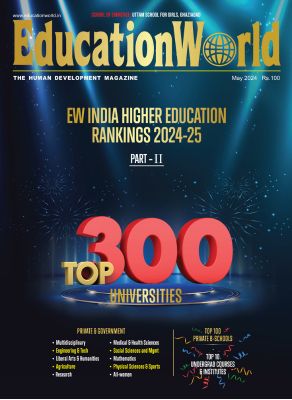 Education has already undergone a remarkable transformation with the advent of the internet, but the integration of AI-powered chatbots such as ChatGPT has revolutionised teaching-learning
Education has already undergone a remarkable transformation with the advent of the internet, but the integration of AI-powered chatbots such as ChatGPT has revolutionised teaching-learning
(Shivam Dutta is promoter-CEO of Alma Better, a Bengaluru-based AI and data science company)
Devyani Mungali It’s no longer a secret that artificial intelligence (AI) is taking over every aspect of human existence. It is making huge strides in finance, healthcare, transportation and education. Once limited to fiction movies, this new-age technology is being used to develop intelligent systems that can function with little or no human intervention. Education has already undergone a remarkable transformation with the advent of the internet, but the integration of AI-powered chatbots such as ChatGPT has revolutionised teaching-learning.
Moreover, the integration of AI-powered, ChatGPT-infused content into curriculums has numerous benefits, ushering in a new era of personalised, engaging, and accessible learning experiences. Let’s discuss some benefits of using ChatGPT in school curriculums.
Personalised learning. Tailoring education to individual needs. One of the prime advantages of incorporating AI-powered ChatGPT into education is personalised learning experiences. By analysing every student’s progress and learning style, this technology can deliver content and feedback tailored to every student’s unique needs and learning capabilities. This personalisation empowers students to learn at their own pace, and teachers intervene to address specific weaknesses.
Enhanced engagement. Fostering motivation through interactivity. ChatGPT’s capability to create interactive and engaging educational content contributes significantly to increased student motivation and interest. From quizzes and interactive lessons to simulations, the dynamic and immersive nature of this tool captivates students, leading to better retention and understanding of subject matter.
24/7 accessibility. Learning anytime, anywhere. AI-powered educational content breaks down the barriers of traditional learning environments. With 24/7 accessibility, students can engage with the study material at their convenience, whether in the classroom, at home, or on the go. This flexibility promotes lifelong learning and widens accessibility for diverse student populations, promoting the culture of continuous education.
Data-driven insights. Informed decision-making for educators. The integration of AI enables the collection and analysis of data on students’ learning styles and outcomes. Educators can leverage these insights to identify areas for improvement, adjust pedagogy, and make data-informed decisions to enhance and refine the curriculum.
Virtual tutors. Round-the-clock support. While virtual classrooms have become mainstream in the education sector, assimilation of AI is making the concept of virtual tutors a reality. AI-powered chatbots are changing how learners engage with online courses, promoting self-directed learning, personalised experiences, instant feedback, and round-the-clock support.
Technology fluency. Navigating the digital age. In the contemporary jobs market, technical fluency is of prime importance. AI-powered educational content exposes students to cutting-edge technology and artificial intelligence applications, making them tech-savvy and comfortable with digital tools. This fluency enhances their competitiveness and adaptability in various career paths.
Problem-solving and critical thinking. Building essential skills. AI-infused content stimulates critical thinking and problem-solving skills, essential attributes in modern-day careers. Students are encouraged to analyse information, make data-informed decisions, and find innovative solutions — skillsets highly transferable to diverse professional landscapes.
Lifelong learning mindset. Adapting to change. One of the most invaluable benefits is cultivation of lifelong learning mindsets. AI-powered tools instill understanding that learning extends beyond graduation. Embracing continuous knowledge and skill updates becomes essential to remaining relevant in the contemporary dynamic jobs market, enabling adaptability and a growth-oriented mindset.
While ChatGPT represents a remarkable advancement in natural language processing, its downside is that it can perpetuate biases and misinformation. As an algorithmic creation, it can be used to reinforce existing societal prejudices encoded in the data it is fed. Additionally, the model’s lack of a built-in truth filter poses a risk of disseminating misinformation. Therefore, it’s imperative for educators to devise rigorous guidelines for dataset curation.
Responsible deployment of ChatGPT also requires continuous monitoring and refining of its training data to prevent plagiarisation and cheating. Collaboration between technologists, ethicists, and diverse communities is essential to ensure that AI serves humanity ethically. Integrating user feedback mechanisms and transparency in decision-making processes can empower users to identify and rectify cheating and misinformation.
Nevertheless, by embracing the power and positive potential of AI, we can lead children towards a future where education will become a lifelong journey of growth and adaptation in a constantly changing world.
Also read: CBSE prohibits use of ChatGPT in class 10, 12 board exams



























